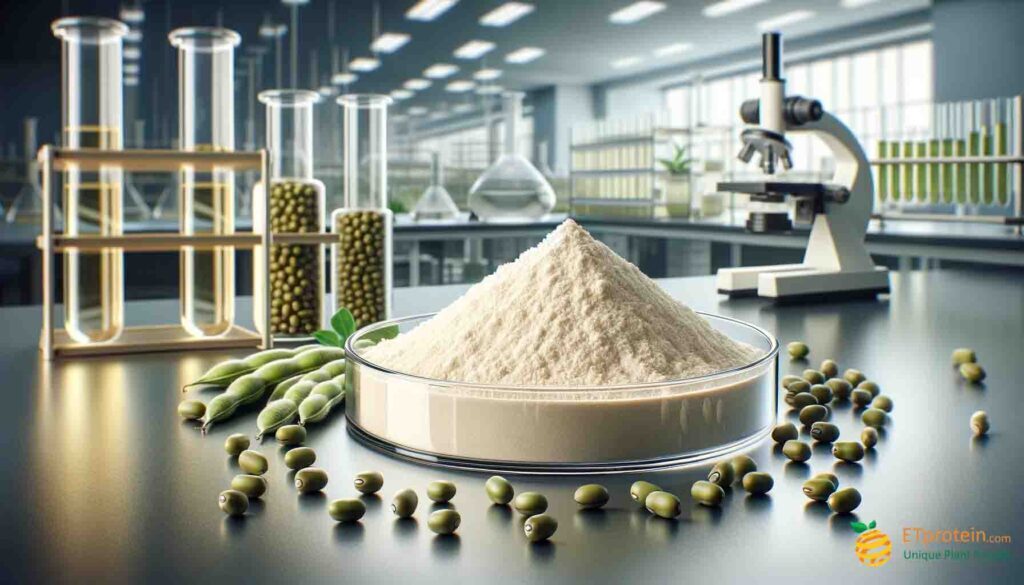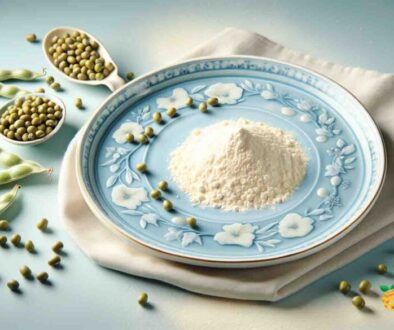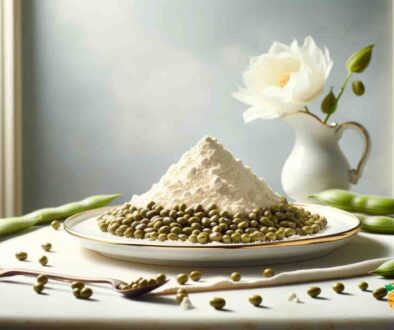Mung Bean Protein: Processing Impact on Subunits, Functionality
Elevate nutrition with pure mung bean protein. Antioxidant-rich, cholesterol-lowering, and versatile. Discover the future of healthy living today!
I. Extraction of Mung Bean Protein
Mung beans, rich in protein, undergo a meticulous extraction process for protein isolation, involving the following steps:
- Cleaning: Mung beans are meticulously washed to eliminate impurities and sediment.
- Soaking: Cleaned mung beans are soaked in an adequate amount of water for several hours to days, facilitating optimal water absorption.
- Milling: The soaked mung beans are milled into a paste using either a milling machine or manual grinding.
- Separation: The resulting mung bean paste undergoes separation to eliminate impurities such as fibers and starch, yielding a crude protein extract.
II. Purification of Mung Bean Protein
To attain high-purity mung bean protein, further purification steps are essential, typically involving:
- Ammonium Sulfate Precipitation: Precipitation of proteins from the crude extract using ammonium sulfate, followed by centrifugation to isolate the protein precipitate.
- Dialysis: Removal of small molecules like ammonium sulfate from the protein precipitate through dialysis, resulting in high-purity mung bean protein.
III. Identification of Mung Bean Protein
Verification of the obtained mung bean protein involves the following methods:
- Gel Electrophoresis: Proteins are subjected to gel electrophoresis to observe their behavior and determine purity and types.
- Amino Acid Composition Analysis: Analysis of the amino acid composition of mung bean protein to ascertain its constituents and concentrations.
IV. Applications of Mung Bean Protein
Mung bean protein finds diverse applications, including:
- Food Additives: Enhancing nutritional value and texture as a food additive.
- Dietary Supplements: Serving as a raw material for health supplements with various bioactivities such as antioxidant, lipid-lowering, and blood sugar regulation.
- Cosmetics: Functioning as a cosmetic ingredient with moisturizing, antioxidant, and skin-whitening properties.
V. Bioactivity of Mung Bean Protein
Mung bean protein exhibits several bioactivities, including:
- Antioxidant Effects: Clearing free radicals and exhibiting antioxidant properties to protect cells from oxidative damage.
- Lipid-Lowering Effects: Lowering cholesterol and triglyceride levels in the blood, contributing to cardiovascular disease prevention.
- Blood Sugar Regulation: Assisting in lowering blood glucose levels, providing auxiliary therapeutic benefits for conditions like diabetes.
VI. Preparation Methods of Mung Bean Protein
Common methods for preparing mung bean protein include:
- Soaking Method: Soaking mung beans in water, followed by milling, separation, and purification to obtain high-purity mung bean protein.
- Enzymatic Hydrolysis: Using enzyme agents to break down mung bean proteins into small peptides or amino acids, followed by separation and purification to achieve high-purity mung bean protein.
VII. Nutritional Value of Mung Bean Protein
Mung bean protein is a high-quality protein source with the following nutritional attributes:
- Rich Amino Acid Content: Contains essential and non-essential amino acids crucial for human nutrition.
- Abundant in Vitamins and Minerals: Enriched with vitamins A, B group, calcium, iron, and other essential minerals, contributing significantly to overall health.
- Promotes Digestion and Absorption: Easily digestible and absorbable, promoting gastrointestinal motility and secretion of digestive fluids.
VIII. Market Prospects of Mung Bean Protein
Given the rising global interest in health-conscious diets and lifestyles, the demand for high-quality proteins continues to surge. Mung bean protein, as an exemplary source, holds vast market potential. Future expansion may involve improving production efficiency, reducing costs, and exploring new varieties to further broaden market reach.
Unlocking the Future of Nutrition with ETprotein’s Mung Bean Protein
In the pursuit of optimal health, consider embracing the nutritional excellence of ETprotein’s Mung Bean Protein. Meticulously extracted and purified, this high-quality protein source boasts antioxidant properties, cholesterol-lowering effects, and versatile applications. ETprotein’s commitment to purity and bioactivity ensures that you’re not just consuming a protein but a transformative ingredient that aligns with your health and wellness goals. Elevate your dietary choices with ETprotein’s Mung Bean Protein—where innovation meets wholesome nutrition.
About ETprotein:
ETprotein, a reputable Chinese manufacturer and supplier, is renowned for producing, stocking, exporting, and delivering the highest quality organic bulk vegan protein and plant proteins. Our offerings, characterized by a neutral taste, non-GMO, allergen-free attributes, cater to a diverse range of industries. We serve nutraceutical, pharmaceutical, cosmeceutical, veterinary, as well as food and beverage finished product distributors, traders, and manufacturers across Europe, USA, Canada, Australia, Thailand, Japan, Korea, Brazil, and Chile, among others.
Our specialization includes exporting and delivering tailor-made protein powder and finished nutritional supplements. Our extensive product range covers sectors like Food and Beverage, Sports Nutrition, Weight Management, Dietary Supplements, Health and Wellness Products, and Infant Formula, ensuring comprehensive solutions to meet all your protein needs.
As a trusted company by leading global food and beverage brands and Fortune 500 companies, ETprotein reinforces China’s reputation in the global arena. For more information or to sample our products, please email sales(at)ETprotein.com today.














